
lisbeth4
(You can read the
beginning of the
story in the
archives if you
missed it.
Note that several of
the images were scavenged off the internet. Click on the image to
find its source.)
CHAPTER IV: SPRING: LETTING THE ANIMALS OUT TO PASTURE
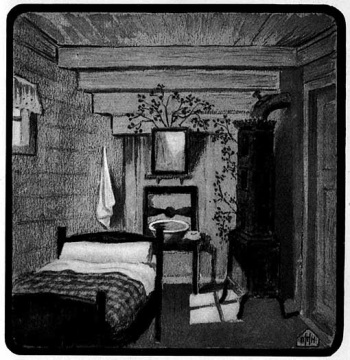 One morning, a few weeks after the sad departure from Peerout Castle,
Lisbeth Longfrock awoke early in the small sleeping room built under
the great staircase at Hoel. She opened her eyes wide at the moment of
waking, and tried to gather her thoughts together. She was conscious of
a delightful, quivering expectancy, and felt that she had awakened to
something great and new,—something that she had waited for and been
exceedingly glad over; but she could not at once remember just what it
was.
One morning, a few weeks after the sad departure from Peerout Castle,
Lisbeth Longfrock awoke early in the small sleeping room built under
the great staircase at Hoel. She opened her eyes wide at the moment of
waking, and tried to gather her thoughts together. She was conscious of
a delightful, quivering expectancy, and felt that she had awakened to
something great and new,—something that she had waited for and been
exceedingly glad over; but she could not at once remember just what it
was.
The little room, whose only furniture consisted of a bed, a chair, a stove, and a small wooden shelf with a mirror over it, was filled with daylight in spite of the early hour. The sun fell slanting down through a window set high up in the wall directly over Lisbeth's bed, and the windowpanes were pictured in bright yellow squares on the floor near the tiny stove. The corner of one square spread itself against the stove, and Lisbeth traced it with her eyes as she lay in bed. At the tip of the corner glimmered something light-green and shiny. Was it from there that a fine, wonderful fragrance came floating toward her? She sniffed a little. Yes, indeed! now she remembered. The fragrance came from the fresh birch twigs she had decorated the room with yesterday. Out of doors it was spring,—the sprouting, bursting springtime. To-day the cattle were to be let out and the calves named. To-day she would begin work in earnest and be a responsible individual. In short, she would be the herd girl at Hoel Farm.
It was now a month since Lisbeth had come to Hoel Farm, but up to this time she had been treated merely as company. She had walked about the place, sauntered after Kjersti here and there in the house, ground the coffee, and brought out from a bowl in the pantry the small cakes that they ate with their coffee every afternoon. Frequently, too, she had had pleasant talks with Kjersti.
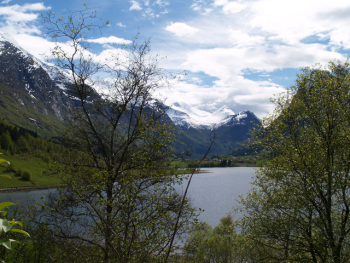 As for helping with the animals,—the
sheep
and the goats had been
let out, to be sure, but nevertheless they did not need her care
because they were allowed, so early in the season, to run about
everywhere except in the garden, and that Bearhunter stood guard over.
In the cow house there was nothing for her to do, for a milkmaid and an
under-milkmaid did the work there. Of course the girl who tended the
flocks ought really to be able to help in milking the cows; but it was
thought that Lisbeth had better wait a year before she tried to do
that,—her hands being rather too small as yet. Lisbeth had kept
measuring her hands every now and then and pulling her fingers to make
them grow; and after a while she had asked the milkmaid if she did not
think they had grown large enough, but the milkmaid did not see that
they were any larger. She could not have very good eyes!
As for helping with the animals,—the
sheep
and the goats had been
let out, to be sure, but nevertheless they did not need her care
because they were allowed, so early in the season, to run about
everywhere except in the garden, and that Bearhunter stood guard over.
In the cow house there was nothing for her to do, for a milkmaid and an
under-milkmaid did the work there. Of course the girl who tended the
flocks ought really to be able to help in milking the cows; but it was
thought that Lisbeth had better wait a year before she tried to do
that,—her hands being rather too small as yet. Lisbeth had kept
measuring her hands every now and then and pulling her fingers to make
them grow; and after a while she had asked the milkmaid if she did not
think they had grown large enough, but the milkmaid did not see that
they were any larger. She could not have very good eyes!
Lisbeth had, of course, expected to take care of Crookhorn,—Kjersti and she both thought she ought to do that; but it had proved to be impossible. Crookhorn had become so freakish that sometimes they almost thought her out of her wits. In the building shared by the sheep and goats she ranged back and forth from wall to wall, knocking against the sheep and the other goats so hard as she went that their ribs rattled. At last she had to be tied to one of the walls, and with the shortest rope possible at that. Nor would she allow herself to be milked peaceably in that building. The first time Lisbeth tried it, Crookhorn, with a toss of the head, gave a kick that sent Lisbeth and the pail rolling off in different directions. Afterward the milkmaid herself took Crookhorn in hand at milking time; but even for her it was always a feat of strength, and she had to have some one to help her by holding the goat's horns.
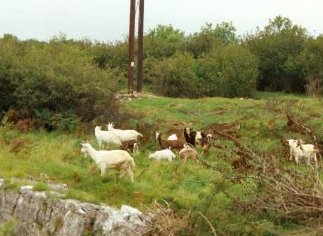 When Crookhorn was let out with the other
goats, would she ramble
with them over the fields and meadows, seeking food? No, indeed! She
would station herself poutingly by the cow-house door and stand there
the livelong day,—"bellowing like a cow" the farm boy said; and then
in
the evening, when the other goats came home plump and well fed, there
Crookhorn would stand as thin and hungry as a wolf.
When Crookhorn was let out with the other
goats, would she ramble
with them over the fields and meadows, seeking food? No, indeed! She
would station herself poutingly by the cow-house door and stand there
the livelong day,—"bellowing like a cow" the farm boy said; and then
in
the evening, when the other goats came home plump and well fed, there
Crookhorn would stand as thin and hungry as a wolf.
Lisbeth thought that Crookhorn, if provided with a stall in the cow house, would act like a reasonable creature again. But neither Kjersti nor the milkmaid would consent to the removal; they thought a goat ought not to be humored in such unreasonable fancies.
Thus it was that
Lisbeth had not had much to do during her first
month at Hoel Farm. The only thing that Kjersti had required of her was
to keep her own little room under the hall staircase in nice order, and
that she had done. Every day she had made the bed herself, and every
Saturday she had washed the floor and the shelf, and spread juniper
twigs about. Last Saturday Kjersti had come out to take a look at it,
and had said to her that she kept her room in better order than the
grown-up girls in the south chamber kept theirs; and Lisbeth knew that
this was true, for she had noticed it herself.
But now everything was going to be different. Kjersti Hoel had come to Lisbeth's room the night before and said that the cows were to be let out early in the morning, and that Lisbeth, like all the rest of the Hoel Farm people, must be up early to help. Later in the day the calves that had been born in the cow house during the winter were to be let out for the first time, and Lisbeth would have to look after them for that afternoon at any rate. Kjersti had said also that Lisbeth was to be allowed to give the calves their names,—names that they would keep all their lives, even after they had grown to be full-sized cows.
The next day after the letting out of the animals Lisbeth was to take a lunch bag and begin her spring work of going into the forest all day to watch the sheep and goats. It would not do to have them running about the fields at home any longer, Kjersti said.
Suddenly Lisbeth recollected what it was that she had pondered over so long as she lay awake the evening before,—it was the names of the calves. In spite of all her pondering she had got no farther than to wonder whether the cow with the red sides and white head and the gentle but bright-looking face should not be called Bliros. That idea, however, she had given up; it seemed to her that only one cow in the world could be called Bliros. Then she had determined to think no longer about Bliros or the names of the calves, and so had fallen asleep.
What if she had overslept herself now! She hoped not, with all her heart, for she had heard Kjersti Hoel say that she did not like girls to lie abed late and dally in the morning. How mortifying it would be for her not to be on the spot as early as the others to-day, her very first working day!
Wide-awake now, Lisbeth hopped quickly out of bed and popped into her long frock. Then, having made her bed with all haste, she opened the door, went out through the hall way, and stood on the outside steps.
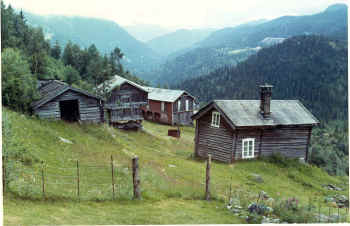 The sun had just risen above the highest
spruce tops over the edge
of the eastern hills, and the light was flooding the sides of the
valley like a waterfall. In the meadows and on the sloping fields the
sunbeams quivered in the dew. They sifted in gold, they glittered in
green, they silvered the clear brooks that babbled down the hills. From
every bush came a twittering and chirping and clapping of wings. From
everything, everywhere, came a message of joy and activity and
sprouting life. Mingled in one great morning effervescence, single
sights and sounds were lost; only the call of the cuckoo, far up on the
birch-clad slope, was heard above the other sounds, and from every
shining window glanced a big, serene eye of reflected sun rays.
The sun had just risen above the highest
spruce tops over the edge
of the eastern hills, and the light was flooding the sides of the
valley like a waterfall. In the meadows and on the sloping fields the
sunbeams quivered in the dew. They sifted in gold, they glittered in
green, they silvered the clear brooks that babbled down the hills. From
every bush came a twittering and chirping and clapping of wings. From
everything, everywhere, came a message of joy and activity and
sprouting life. Mingled in one great morning effervescence, single
sights and sounds were lost; only the call of the cuckoo, far up on the
birch-clad slope, was heard above the other sounds, and from every
shining window glanced a big, serene eye of reflected sun rays.
And just as there were thousands of different sounds, so were there also thousands of different odors,—from the steaming earth, from the growing grass, from buds and blossoms; and above them all, like the cuckoo's call that was heard above the thousands of blended sounds, rose the fine, penetrating fragrance of newly sprouted birch trees.
Lisbeth stood still awhile, drawing deep breaths and letting the sweet air and the effervescence of spring stream in upon her. Then she looked around at the different farm buildings. Quiet brooded within them and every door was shut. Of all the living creatures belonging to the farm, not one was to be seen except Bearhunter, who got up slowly from the flat stone where he had been lying, comfortably sunning himself, and came over to her, looking up into her face and wagging his tail.
Truly, she believed she was the first one up on the whole farm to-day.
Well, of course she would have to wait. So she sat herself down on the steps.
Oh, no; it was just as she might have known it would be. Kjersti Hoel was up. Lisbeth heard her come out of her own room into the kitchen, take a big stick, and knock three times on the ceiling to waken the girls in the south chamber.
In a moment Lisbeth heard a thump! thump! as the girls hopped out of bed, and then a clattering noise as they put on their shoes. Soon Kjersti came out of the house. She was going over to the building where the men slept to waken them.
Catching sight of Lisbeth, she exclaimed: "No! this cannot be Lisbeth already up. What a wide-awake little girl! I think I shall have to make you head milkmaid."
At this Lisbeth became so shy that she could not raise her eyes to look at Kjersti; but it must be acknowledged that when the head milkmaid and the other girls came downstairs a certain small nose was tilted a little higher than usual.
Soon there was life and motion over the whole farm. The activity was very different from that of ordinary days, for everything was done with extra haste, and all that was done seemed to have some connection with the cow house. The doors at both ends of this building stood wide open, and every one seemed to have an errand which obliged him to pass through. The spring air streaming in made the cows turn around in their stalls, stretch their nostrils, and look out. When Kjersti herself appeared on the scene, after the girls had begun milking, and talked to the cows and patted the neck of the bell cow, the creatures at once realized what day it was. The bell cow threw up her head and bellowed till the cow house echoed. That was a signal for all the other cows. They pulled at their chains, swung their tails, and one after another, along the whole row, joined in a manifold bellow of joyful expectancy that shook the entire cow house and seemed as if it would never end. Above the many-voiced chorus could be heard the bellowing of the big bull, deep and even and good-natured, as if he did not need to exert himself in the least in order to be heard.
Although everything went so much more speedily to-day than usual, the time seemed long to Lisbeth Longfrock. When the farm people went into the house to eat their early breakfast, she could not understand how they could sit at the table so long. She finished her meal very quickly and asked if she might not go and let out the smaller animals,—the sheep and the goats,—so that that would be done. Yes, Kjersti said she might. In a trice, therefore, she had them out, and as usual they scattered in every direction, leaping and capering,—all except Crookhorn, who seized her chance to slink into the cow house through the open door; but Lisbeth was so busy that she did not notice this.
All at once there came an instant's stillness, as if everything listened. Then from the farmhouse the tuneful clanging of a deep-toned bell was heard, and in a moment this was answered by such a joyful lowing and bellowing, such a sniffing and rattling of chains, that it seemed as if a thunderstorm were passing over the farm; for when the animals recognized the sound of that deep-toned bell, which they had not heard since they were shut up in the cow house the autumn before, they knew that the time for being let out into the open air was close at hand.
A formal procession now issued from the farmhouse. Kjersti marched at the front, carrying the big iron-bound cow collar to which the deep-toned bell was fastened; next came the head milkmaid, followed by the under-milkmaid; then the girls who worked in the farmhouse; and then the two farm hands, with thick sticks, which they afterwards dealt out to the company, giving one to Lisbeth as well as to the rest. Last of all came Bearhunter, who also wanted to have a part in what was going on.
When the procession reached the cow house there was again a sudden silence. The cows, one and all, turned their heads toward the people as they came in, and looked at them with large, expectant eyes.
The procession then divided into groups, and definite work was assigned to each person. The head milkmaid was to unfasten the cows; Lisbeth and the under-milkmaid and the housemaids, each with her stout stick, were to steer the cows out through the door; the farm hands were to stand in the cow lane to meet the creatures and guide them into the right road (they were to be pastured up in the north meadow) and to separate those who fought with each other; and Kjersti and Bearhunter were to watch everything from the gateway.
All was ready. The moment for the start had come.
Kjersti went into the stall of the cow who was to wear the bell. The cow straightened herself up, lifted her head as high as she could, and then stood stock-still. She knew very well that she was the principal cow of the herd, and that the first place when they went out and in through the cow-house door belonged to her; but she knew also that even she had to be on her best behavior when Kjersti, the mistress of the whole farm, did her the honor of clasping around her neck the cow collar with its bell,—emblem of dignity and power,—and of unfastening the chain that held her in the stall. Kjersti clasped on the bell and unloosed the chain, which fell rattling to the floor; and then the bell cow swung slowly and deliberately out of the stall, like a big, heavy ship out of its dock, and wended her way with solemn dignity toward the door. She carried her head so high and so stiffly that you could not see the least swaying of her horns, and her bell gave only a single decided stroke at each step.
The next to be let out was the big bull. The head milkmaid unloosed him, and he sailed out just as stiffly and heavily as the bell cow had done, with horns so high that they nearly touched the cow-house roof, and so wide apart that they seemed to stretch across the whole passageway. Lisbeth had never realized before how large the bull was.
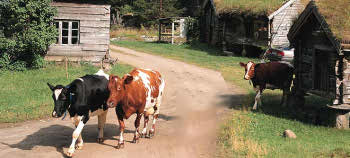 And then, one by one, in regular turn, the
rest of the cows marched
out. They were Brindle, Morlik (which means "like its mother"), Goldie,
Speckle, Blackie, Pusher, Summer-Leaf, Darkey, Wee Bonny, Trot-About,
Wreathie, and Moolley. Wreathie was so named because the white marks on
her hide looked something like a wreath.
And then, one by one, in regular turn, the
rest of the cows marched
out. They were Brindle, Morlik (which means "like its mother"), Goldie,
Speckle, Blackie, Pusher, Summer-Leaf, Darkey, Wee Bonny, Trot-About,
Wreathie, and Moolley. Wreathie was so named because the white marks on
her hide looked something like a wreath.
Beyond the cow stalls, now empty, were the stalls of the heifers, whose names no one quite remembered as yet, and of the half-grown bulls, who did not have any names at all.
When it came to the unloosing of the heifers and young bulls, the scene grew livelier and livelier. They stretched their necks and rubbed against their chains. They fell on their knees as soon as the unlooped chains slipped from their necks, and as they sprang up again you could hear their legs creak,—so stiff were they from standing in the stall all winter. They ran plump against the side wall or up into the wrong passageway. They dashed noisily against the door, two reaching it at the same time and trying to rush through together but getting wedged by their fat sides; while those who had been set free after them came close on their heels, pushing, clashing their horns, butting and bellowing,—until suddenly, the blockade being broken, out rushed the whole throng.
Directly in the wake of the heifers and young bulls, to Lisbeth's extreme surprise, followed Crookhorn, who, kicking up her heels, made a swift dash out through the doorway.
Outside the cow house, too, all was life and stir. As the animals came into the lane, they lifted their heads, sniffed the air from the mountain side, and became eager and excited. Stiff-legged old cows, as well as young calves, kicked up their hind legs and made frolicsome leaps this way and that. They rushed playfully or angrily at each other, clashing their horns, and giving a short bellow if worsted in the tussle; then they dashed off to assail other members of the crowd. Everything combined to form a hubbub of lowing and bellowing, horn clashing and fence creaking, whacking of sticks and shouting of people; while back and forth through all the confusion, with his horns high above all the other horns, went the big bull, like a great heavy snowplow, clearing the way. Of the whole herd, only one cow stood undisturbed amid the wild uproar, calmly waiting and looking about. That was the bell cow, whom, of course, none of the other cows dared to disturb.
At last the head milkmaid came to the front and gave a call. The bell cow threw up her head and with a loud, echoing bellow started to follow her. Next came Brindle, still sniffing with anger after her many encounters. She had got the best of all who were worth getting the best of, and if she could not be the bell cow, she would, at any rate, stand next to her.
Directly after Brindle came Crookhorn, with a self-important air and making herself as tall as possible. But Brindle was in no mood for seeing the funny side of things to-day, so she lunged out with one of her long hind legs and gave Crookhorn a blow on the head that made the prideful goat see stars. But Crookhorn merely tossed her head and went on as if nothing had happened. Such actions, she thought, were probably customary among cows.
The head milkmaid kept on calling, and the cows, one after another, hearing her voice, started toward her. Soon the whole noisy herd, led by the deep-toned bell and urged by shouts and flourishing of sticks, was going in full swing toward the north meadow.
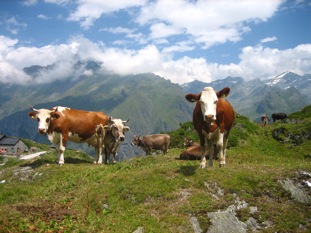 Up in the meadow, which they reached after
a while, the ground was
level and there was plenty of room, so that the danger of collisions
and other accidents was lessened. The young creatures danced around in
wild play, and those of the cows who had not settled the question of
mastery fought now a battle that was to be decisive for the whole
summer. Soon, however, everything became quiet again, and in a couple
of hours all of the animals, even the worst combatants, were grazing
placidly side by side.
Up in the meadow, which they reached after
a while, the ground was
level and there was plenty of room, so that the danger of collisions
and other accidents was lessened. The young creatures danced around in
wild play, and those of the cows who had not settled the question of
mastery fought now a battle that was to be decisive for the whole
summer. Soon, however, everything became quiet again, and in a couple
of hours all of the animals, even the worst combatants, were grazing
placidly side by side.
After this the farm people began to go home,—all except the head milkmaid and Lisbeth, who were to remain a while longer so as to be on hand in case anything happened. And something did happen. Brindle, whose quiet behavior had been only temporary, soon began to rove uneasily back and forth, sniffing hard. She was really the one who ought to be wearing the bell, she sniffed to herself; and then suddenly, with a violent rush, she hurled herself at the bell cow. Such a fight as there was then! The turf flew in all directions. Soon a sharp crack was heard, and a short, wild bellow, and one of Brindle's horns hung dangling.
Brindle shook her head till the blood splashed; then, giving another bellow, she turned and ran the shortest way home as fast as her legs could carry her, never stopping until she had reached the cow-house door. There she gave vent to a terrible bellowing, as if she wanted to bring all the farm buildings down over the people's ears.
After dinner the calves were let out. Lisbeth had finally named the three cow calves Yellow Speckle, Redsides, and Young Moolley, but as yet she had found no name to suit her for the bull calf. Lisbeth saw plainly that Kjersti wondered why she had not called any of the calves after Bliros (Gentle Cow), but she gave no sign of having noticed Kjersti's thought.
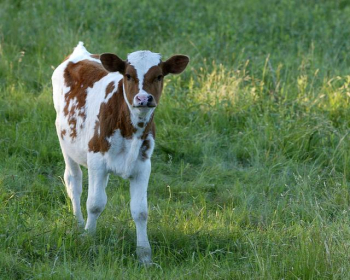 This is the way the calves were induced to
leave their pen and to
cross the cow-house floor. To begin with, a good-sized pail with a
little milk in it was held out to each calf. In their eagerness to get
the milk the calves thrust their heads clear into the pails; and when
the persons holding these began to run, the calves ran too, with the
pails over their heads like hats. Outside the cow-house door the pails
were snatched off and there stood the calves, who had never before been
beyond their pen, in the very midst of the great, wonderful new world.
This is the way the calves were induced to
leave their pen and to
cross the cow-house floor. To begin with, a good-sized pail with a
little milk in it was held out to each calf. In their eagerness to get
the milk the calves thrust their heads clear into the pails; and when
the persons holding these began to run, the calves ran too, with the
pails over their heads like hats. Outside the cow-house door the pails
were snatched off and there stood the calves, who had never before been
beyond their pen, in the very midst of the great, wonderful new world.
The startled creatures gave an amazed look and then began to back, just as if they felt themselves suddenly standing at the head of a steep stairway; but soon they ventured to put one foot carefully forward, then another, and another. It was slow work, one step at a time; but at length they found that there was firm ground in this new region. They concluded that the world was only a larger calf pen, after all; but it was a wonderfully light calf pen, and its walls were certainly a long way off. Swish! up went their tails into the air and away they scampered like the wildest of forest animals.
Then began a great race in the big field,—from fence to fence, this way and that, crosswise, and round and round. Every time the calves jumped over a hillock Kjersti and Lisbeth saw their tails stand straight up against the sky like tillers. Lisbeth thought she had never seen anything so funny. But they could not keep together long. They soon ran off in various directions, and in the evening Lisbeth had to go to the farthest corners of the field with a pail and coax them home one by one; for of course they did not have sense enough to know when to go home,—they who were out in the world for the first time!
Lisbeth was lying again in her little room. It was the evening of her first working day. She had said her simple evening prayer, as usual, and then stretched herself out on the bed, feeling how good it was to rest, for her body was tired through and through.
What a day it had been! A long day, too, she knew; nevertheless, she could not imagine where it had gone. She felt that she must think over all that had happened. But drowsiness came stealing upon her and threw the scenes of the day into confusion. She saw a pair of big horns that plowed like a snow plow through a swarming crowd, and then she saw Brindle standing in her stall with her head on one side and a big bandage over one of her horns, looking exactly like an old peasant woman with a kerchief tied around her head for a headache; and then she thought she saw, written in the air, a couplet that she had once heard:
Rearing its tail against the sky,
Danced the calf on the hilltop high.
And then Lisbeth Longfrock fell asleep.
The next day, with the lunch bag upon her back, Lisbeth Longfrock set out for a forest that lay not far off, taking the sheep and goats with her. She had not succeeded in getting Crookhorn to go along, however. The self-willed goat had taken the shortest cut up to the north meadow, where the cows were again pastured.
Lisbeth's second working day, like her first, seemed a very long one, for the forest was wonderfully lonesome and still. The little girl had time to think of many, many things,—of her mother and Jacob and Peerout Castle; and it must be acknowledged that she cried a wee bit, too.
To be continued tomorrow....
Want more in-depth information? Browse through our books.
Or explore more posts by date or by subject.
About us: Anna Hess and Mark Hamilton spent over a decade living self-sufficiently in the mountains of Virginia before moving north to start over from scratch in the foothills of Ohio. They've experimented with permaculture, no-till gardening, trailersteading, home-based microbusinesses and much more, writing about their adventures in both blogs and books.
Want to be notified when new comments are posted on this page? Click on the RSS button after you add a comment to subscribe to the comment feed, or simply check the box beside "email replies to me" while writing your comment.
